Is it anti-social to use barbecues in parks?
- Published
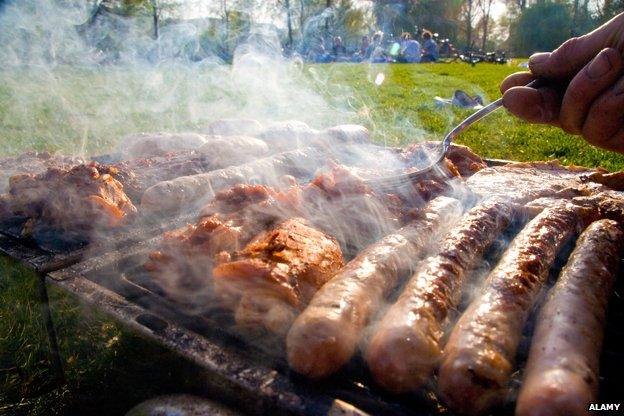
Cities around the world are debating whether to permit barbecues in municipal open spaces. What are the dos and don'ts of grilling food in public?
You might recognise the scene on a large patch of public grassland. The odour of inexpertly-charred meat. The babble of drunk people congregating. The spectacle of adults in shorts, arms folded, cheeks flushed with indignation, shouting at each other.
Barbecues are a precarious enough social occasion when they occur in the privacy of a back garden, with smoke and chatter billowing across fences, potentially inciting the ire of neighbours.
In communal spaces like parks - where one ratepayer's carefree al fresco culinary get-together is another's smoke-belching, grass-scorching, noisy, litter-strewn, anti-social nuisance - the capacity for confrontation and awkwardness is even greater.
Around the world this summer, civic leaders are grappling with a shared dilemma. In the New York borough of Brooklyn, there are calls to ban grilling in Prospect Park in an effort to rid it of "toxic fumes", external.
In Camden, north London, by contrast, a long-standing and controversial, external barbecue ban is about to be overturned, external - following in the wake of neighbouring Islington, which lifted a similar prohibition in 2011.
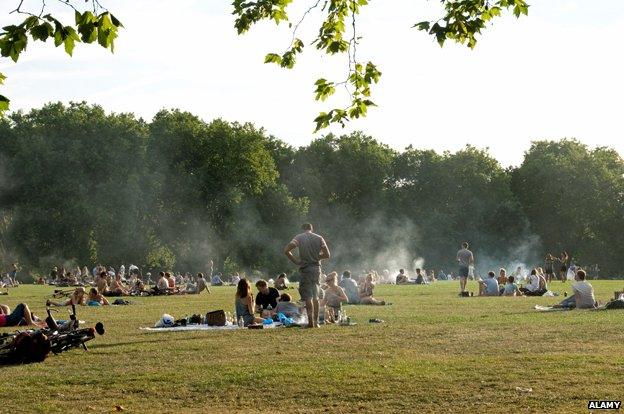
Highbury Fields, north London: A park where barbecues are allowed
The issue can be deeply emotive. Leaders at Bristol City Council were accused of staging "an assault on civil liberties", external when they proposed restricting a range of activities including lighting barbecues in parks.
In Rockdale, a suburb of Sydney - where cooking outdoors is widely seen as an expression of national pride - the failure of an effort to overturn a similar ban led to a mass walkout from the council chambers., external
By contrast, some naysayers are implacably opposed to the practice of barbecuing in parks under any circumstances.
"Cooking in public places should be illegal," insists Masterchef judge Gregg Wallace, a noted barbecue-phobe. "It's going to smell. It's going to cause a mess. If you want to cook you should do it in the kitchen.
"This is Britain. We have picnics. If you want to have a barbecue, put on a pair of Bermuda shorts and get on a plane for 20 hours to Australia or New Zealand."
Wallace might feel at home in Bejing, which recently banned all outdoor barbecues in an effort to cut pollution. But for all it can provoke conflict, cooking on open ground can be a deeply liberating experience - especially for urban-dwellers who are normally confined to garden-less flats.
"There's something joyous about being able to have a barbecue in your local park," says Camden councillor Sally Gimson, who was partly responsible for overturning the borough's ban, which takes effect from 21 July. "Barbecues are a sign of summer, they're a sign of having some fun."
Until now not everyone in Camden, which has large pockets of deprivation concentrated in high-density housing estates, has been able to enjoy this simple warm-weather pastime. "There are families who don't have gardens of their own, who can't afford to go away for the summer holidays," says Gimson. Allowing grilling in parks is aimed at helping precisely this group.
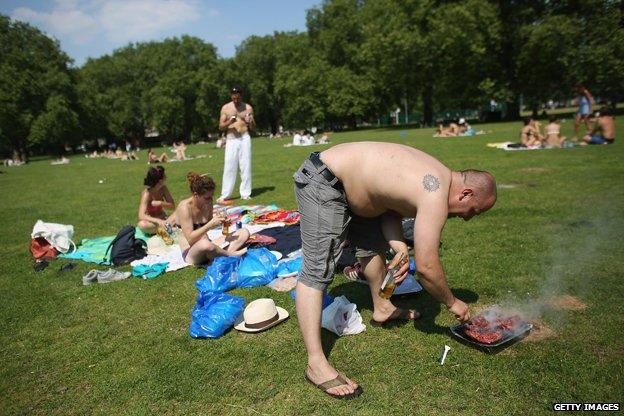
The council will still apply strict rules even after the ban is lifted. Disposable barbecues - the cheap foil tray variety sold in pound shops and supermarkets, widely blamed for scorching the grass - will remain forbidden, as will those powered by gas canisters.
Portable barbecues - which cost about £10, and are raised on legs to prevent them from damaging the earth - will be permitted. But Gimson acknowledges it won't be possible to police every acre of parkland all the time to ensure the correct type is being used.
Some councils provide designated spaces and stands for barbecuing to prevent the earth being damaged. But essentially it's the responsibility of barbecuers themselves to cook with consideration for others.
But the protocol of holding a barbecue in a park is trickier to negotiate than with one held on private property, says William Hanson, author of The Bluffer's Guide to Etiquette.

Tips for lighting barbecues safely
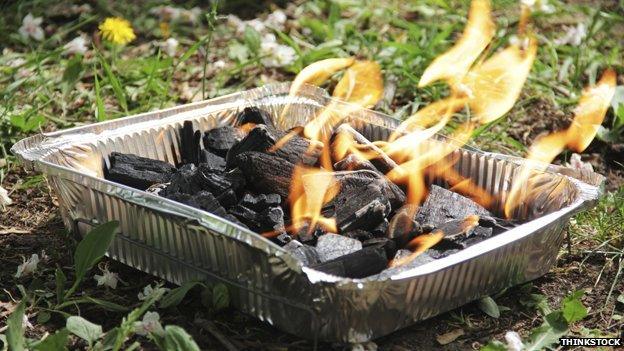
Make sure your barbecue is in good working order
Ensure the barbecue is on a flat site, well away from a shed, trees or shrubs
Keep children, garden games and pets well away from the cooking area
Never leave the barbecue unattended
Keep a bucket of water or sand nearby for emergencies
Ensure the barbecue is cool before attempting to move it

If you were throwing one in your back garden, and the smell and the noise were likely to drift over the wall, it would be good manners to invite the neighbours. But in a park it's not practical to hand round sausages or grilled halloumi to everyone.
"If you can, try and find a part of the park downwind that's tucked away where the smell isn't going to drift around," Hanson advises. "If that's not possible, say to people around you, 'I'm terribly sorry - if it's a nuisance let us know.'" They probably won't do anything of the sort, but at least you'll have shown them some consideration.
The most important thing is to clean up litter, he says. And it's never acceptable to damage grass unless it's in your own garden.
But even considerate cooks might cause friction. Someone who has turned up in a park hoping for a bit of peace and quiet to read won't be happy if an outdoor dinner party decamps next to them, even if they keep the noise to a minimum and clear up after themselves.
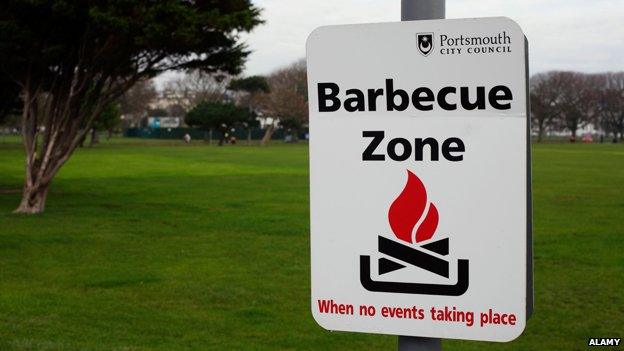
There are different national and ethnic cultures about what constitutes public and private space, says Chicago University anthropologist Richard Shweder, author of Why Do Men Barbecue? Recipes for Cultural Psychology. Especially in large cities, there's plenty of potential for misunderstanding.
"In Judeo-Christian tradition, sharing the meal is a very important part of family solidarity," Shweder says. "It's celebratory - we are sharing food. To the extent that people resent barbecues in parks, it might be because they feel those around them are not part of their 'family'."

Barbecue recipes from BBC Food
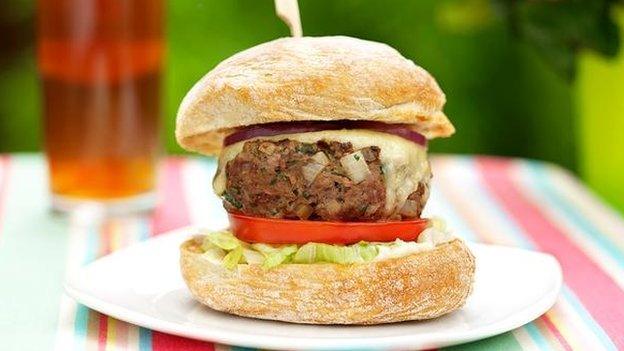

Ultimately, those who are unwilling to live and let live might be best advised to steer clear of public parks in the first place.
And conflict and misunderstanding will arise wherever large groups of strangers gather. Especially when food is involved. As anyone familiar with the sights, sounds, smells and tastes of summer will be aware.
Subscribe to the BBC News Magazine's email newsletter to get articles sent to your inbox.
Readers discussed if it is anti-social to use barbecues in parks on our Facebook page, external.